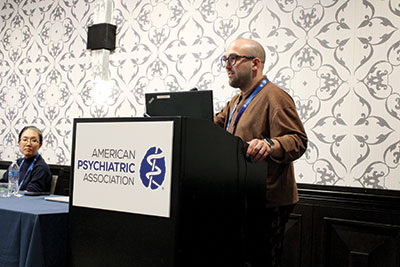
At APA’s Mental Health Services Conference, experts described the importance of bringing the informed consent model to gender-affirming care, both to best support patients and families and to limit gatekeeping for surgical interventions.
Patients in the gender diverse community often face significant mental health disparities, with higher rates of depression, anxiety, and suicide attempts. With this in mind, and considering the often immense barriers to care these patients face, experts at APA’s Mental Health Services Conference urged attendees to use the informed consent model, the gold standard for most interventions, when working with these patients.

The informed consent model balances patient autonomy with the principles of beneficence and nonmaleficence to enable patients to make medical decisions based on accurate information in a developmentally appropriate manner.
Many surgeons and insurance companies still require letters of support from mental health professionals before patients can access gender-affirming surgeries. This places psychiatrists in the potential role of gatekeeper, forcing patients to see them only to confirm their gender identity so they can access gender-affirming care, explained Hyun-Hee Kim, M.D. The underlying principle of the informed consent model, however, is autonomy.
“Given the individual, deeply personal nature of gender, because it so uniquely pertains to personal identity, this is the model that makes sense for me as a clinician to be centered in,” said Kim, a child and adolescent psychiatrist at Massachusetts General Hospital. The model involves walking the patients through the information they need to understand and the impacts of the gender-affirming surgery and then making adjustments to the explanation based on each individual patient’s needs.
Further, Kim outlined the companionship model, which expands on the informed consent model. The companionship model acknowledges the historical and ongoing harm done by gatekeeping and makes it an explicit part of the letter-writing session. Because it focuses on the patient’s goals and overcoming barriers to accessing care, Kim argued that the companionship model is much better to meet the actual needs of patients and families.
Kit Rainboth, M.S.W., L.I.C.S.W., is a clinical social worker on Massachusetts General Hospital’s Transgender Health Program team. Rainboth spoke about the importance of speaking with patients about the systemic inequalities that gender diverse individuals face, as well as political efforts to limit access to care. “This can be a conversation we have with patients,” they said. “We can ask them: Have you thought about how the system really impacts your health?”
Nester Noyola, M.A., a clinical fellow in psychology at Massachusetts General Hospital who provides gender-affirming psychotherapy to gender diverse youth, emphasized that gender diverse teens and their families may have very different needs that the mental health professional must take into consideration.
“A useful way of proceeding when there’s dissonance between youth and their families is focusing on promoting what we call shared decision-making,” Noyola said. Shared decision-making fosters communication and also allows adequate time for all those involved to process the new information and make well-informed decisions.
“The issue here is that as providers, we must balance the duty to protect patients from harm, along with respect for parents’ authority and adolescents’ autonomy,” Noyola continued. He noted that teens’ emerging autonomy must also be understood from a developmental perspective.
Aude Henin, Ph.D., co-director of the Child Cognitive Behavioral Therapy Program at Massachusetts General Hospital, pointed out that, when working with children, employing the informed-consent model means working with the entire family.
Henin explained that parents and children are often in very different stages when the child comes out to the parent. The child may be immediately ready to start seeking gender-affirming interventions, while the parents need more time.
But research has shown that parents may have positive responses to their child’s gender identity over time. Henin cited a 2021 study published in the Journal of Homosexuality that surveyed parents when their children came out as transgender and then again one year later. They found that the percentage of mothers and fathers who had positive responses to their children’s gender identity increased for both transfeminine and transmasculine youth. The authors noted that greater parental support was associated with less parental abuse and depressive symptoms among youth.
Ideally, mental health professionals can guide parents as they become more accepting. Parents often cite lack of knowledge or awareness and fear as the two biggest factors that get in the way of supporting gender-affirming interventions. “That tells us what we can target with interventions,” Henin said. ■